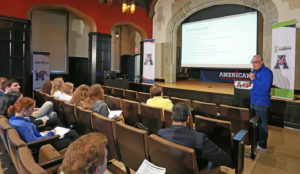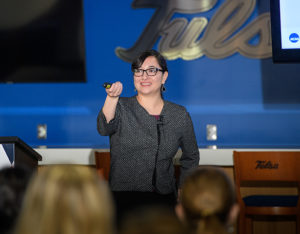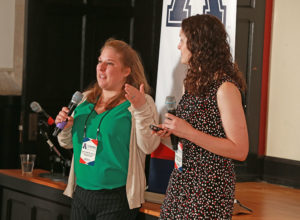 Leaders from the American Athletic Conference and its 13 member institutions gathered at The University of Tulsa for the third annual Academic Consortium Symposium on March 28-30, 2019. The symposium brought together scholars, practitioners and current and former students to discuss the avenues that will improve overall well-being of both students and student-athletes.
Leaders from the American Athletic Conference and its 13 member institutions gathered at The University of Tulsa for the third annual Academic Consortium Symposium on March 28-30, 2019. The symposium brought together scholars, practitioners and current and former students to discuss the avenues that will improve overall well-being of both students and student-athletes.
TU Faculty Athletics Representative Christopher Anderson and Dr. Gerard P. Clancy, president of TU, served as facilitators. The event kicked off on March 28 with a welcome reception at TU’s Henry Zarrow Center for Art and Education in Tulsa’s Arts District hosted by Clancy and the university’s Board of Trustees.
One recurring theme that arose from the symposium was the desire for TU to not only serve itself, but also the community. In the opening remarks, Anderson said, “We want to be heavily involved in the community. We involve them with us, and they involve us with them.”
 Jessica Wagner, assistant director of prevention and health promotion for the NCAA, shared initiatives on student-athlete mental health and explained why mental health was the key focus for the conference.
Jessica Wagner, assistant director of prevention and health promotion for the NCAA, shared initiatives on student-athlete mental health and explained why mental health was the key focus for the conference.
“Before the NCAA’s Sports Science Institute was formed, we expected to hear that concussions were the greatest concern coming from NCAA universities. Instead, mental health was the greatest concern – even more so than concussions,” Wagner said. She went on to explain how programs were being put in place to support college athletes.
During his keynote address, Clancy, a psychiatrist who treated patients up until being introduced as TU’s president in 2016, explained the neuroscience of depression and suicide.
 After engaging the audience with images of human brain scans and outlining the activity or disease associated with each, Clancy went on to explain how depression can be identified, managed and destigmatized. “Clinical depression is a brain disease. It’s very important for all of us to fight the stigma of mental illness,” he said. “Clinical depression should be treated early, as this can help prevent more episodes later in life.”
After engaging the audience with images of human brain scans and outlining the activity or disease associated with each, Clancy went on to explain how depression can be identified, managed and destigmatized. “Clinical depression is a brain disease. It’s very important for all of us to fight the stigma of mental illness,” he said. “Clinical depression should be treated early, as this can help prevent more episodes later in life.”
Clancy transitioned into a discussion about suicide, pointing to the dangerous extreme of brain disease to explain why depression needs to be held in the utmost importance moving forward, and offering potential treatments on the horizon.
 Anderson said the symposium gave TU an opportunity to lead a positive change in the American Athletic Conference, pointing to Clancy’s leadership as a catalyst in this development. “President Clancy is at the forefront of a lot of things, and the topic of this conference is something interesting to him both professionally and personally,” Anderson said. “He’s capable of helping the conference, and he’s a man who will stand up and do the right thing simply because it’s the right thing to do. With so much expertise assembling at the symposium, joined by so many powerful student-athlete voices, I’m sure we will soon see new ways to handle these issues that have yet to be considered.”
Anderson said the symposium gave TU an opportunity to lead a positive change in the American Athletic Conference, pointing to Clancy’s leadership as a catalyst in this development. “President Clancy is at the forefront of a lot of things, and the topic of this conference is something interesting to him both professionally and personally,” Anderson said. “He’s capable of helping the conference, and he’s a man who will stand up and do the right thing simply because it’s the right thing to do. With so much expertise assembling at the symposium, joined by so many powerful student-athlete voices, I’m sure we will soon see new ways to handle these issues that have yet to be considered.”
In addition to Clancy’s keynote address, the symposium showcased the talent found across Tulsa’s campus through several presentations tackling various topics.
Lisa Cromer, associate professor of psychology, led a presentation on her Golden Strategies and Techniques for Achievements, Resilience and Transition (START) program, which received a consortium grant for research. The program helps students learn skills for dealing with stress, coping and the rush of college life.
“You can’t go to the gym and gain physical strength overnight, and we made sure the student-athletes understood that same concept applies to the psychological issues we’re discussing,” Cromer said. “Just like gaining muscle, learning these skills is done with reps.”
 Rachel Hildebrand, TU’s director of athletic training, presented with Laura Wilson, assistant professor of speech-language pathology, about wearable technology and concussion monitoring. Hildebrand acknowledged with a laugh, “This might be a spoiler, but there are no wearable devices that monitor concussions the way we want them to.”
Rachel Hildebrand, TU’s director of athletic training, presented with Laura Wilson, assistant professor of speech-language pathology, about wearable technology and concussion monitoring. Hildebrand acknowledged with a laugh, “This might be a spoiler, but there are no wearable devices that monitor concussions the way we want them to.”
That said, there are a good deal of technologies that monitor head trauma to some extent, and Hildebrand and Wilson explained what they were, how they are working to improve concussion safety and the pros and cons of such technologies. “It’s important to realize that all of the devices out there offer indirect measurements of the trauma. There is not as much directionality associated with it, so their output is still one step removed from thinking about how the brain is actually moving in the head,” Wilson said.
A special Athletic Director’s Presentation featured a discussion with Akayleb Evans, a cornerback for The University of Tulsa. Evans spoke about student-athlete activism and the importance of being “more than an athlete” on campus, in the community and in life.
The conference also shined the spotlight on a TU graduate student. Devin Barlaan, along with Cromer, introduced the Student Health, Athletic Performance and Education (SHAPE) program, which is designed to provide psychological skills training to promote optimal performance for student-athletes in the classroom and their sport.
Clancy might have best summarized the symposium: “Not only was this a great opportunity to show off our amazing city to the rest of the conference, but this was also a great opportunity for the American Athletic Conference to distinguish itself, focusing on an important topic. The responsibility of universities is to get the most pressing issues in front of people, and the destigmatization of mental illness – specifically how we can help students do better – is really important, so that’s what we’ve done.”






